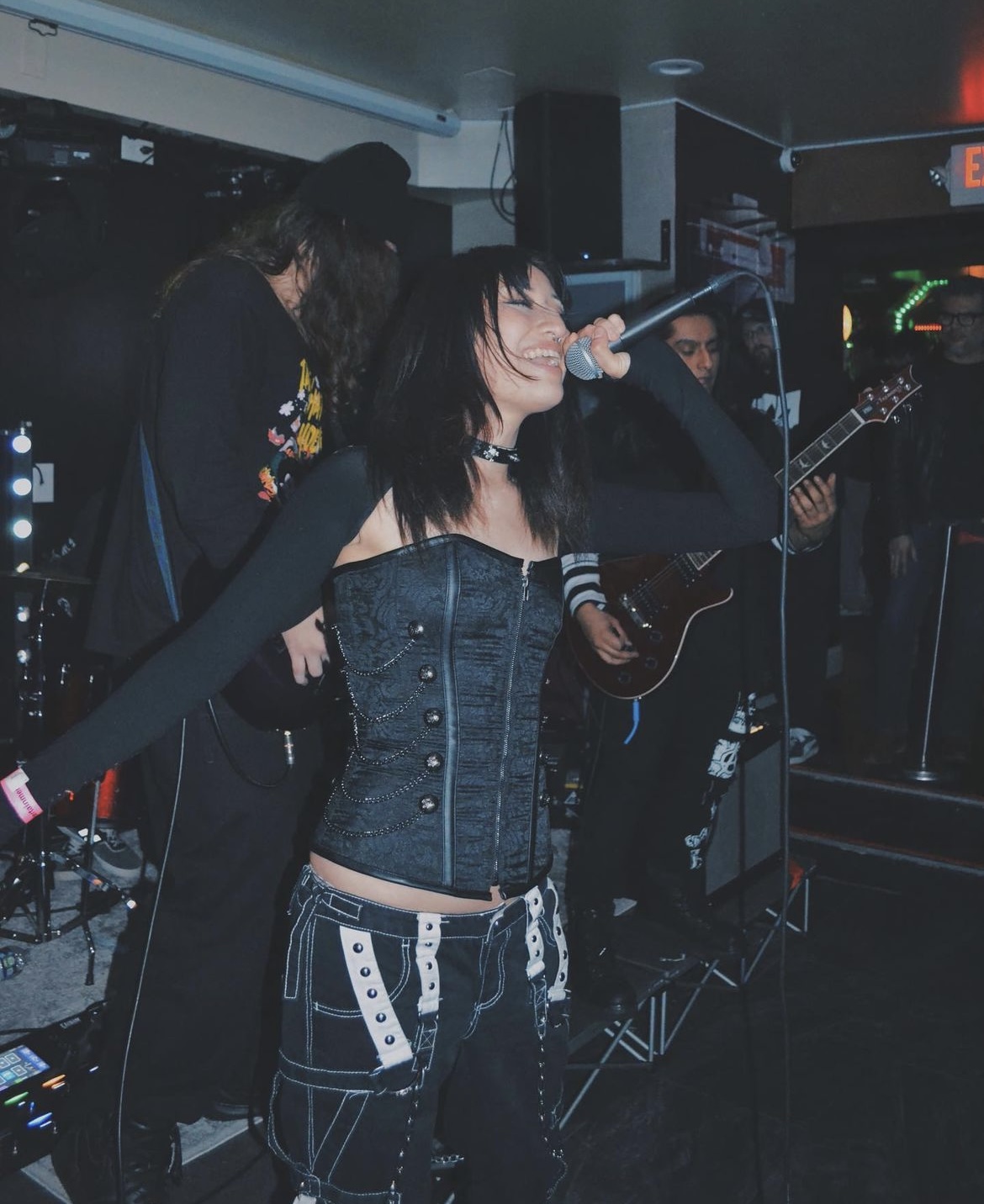
As a young girl, there were two things Dani Arana loved — singing and anime. Whether it was singing Kelly Clarkson or belting Katy Perry in the living room, she would wear the comic booky Japanese brand Toki Doki. So, it’s no surprise that she now calls herself Dani Doki.
Dani Doki, 22, is a solo artist trying to make it in New York City. She produces a mix of techno and pop rock — neo-pop Grimes and a very modern-sounding version of Haley Williams from Paramore. Doki’s solo songs are Fatal Attraction (2021), Dreaming (2021), and PLAYSTATION (2021), and her collabs are with Dev Gajan, her producer, in Cowboy Killer (2022) and The City That I Live In (2022).
***
When I meet Dani Arana at Mogë Tee, I know it’s going to be a place she will enjoy. Mogë Tee is a Japanese bubble tea place — with a wall of fake leaves and little teacups attached — and I am right. Slurping her Rose Milk Bubble Tea, she shows me her backpack covered with anime characters. “I’ve had this backpack since I was 12–years–old,” Arana tells me, laughing.
She looks like a textbook punk at first glance: wearing all-black from head to toe with an oversized ripped black sweater, a silver chunky necklace, black Tripp pants, and New Rocks. But then you realize it’s just a little girlier and recognize her as a real-life Nana Osaki, her favorite anime. She has thin straight dark eyebrows, big eyelashes, a hard eyeliner line, a septum piercing, and a lower lip piercing.
Arana gives me a tight hug and comments on my lipstick: “You look like Anne Hathaway with the red!” Arana likes to talk with her hands to add emphasis, leaning in closer. She is a speed talker. She will talk your head off — happily telling stories about crazy gigs she’s had, and anything else she’s thinking about. I sip my Da Hong Pao Milk Bubble Tea and eagerly listen.
Arana was born and raised in Sterling, Virginia, and has been pursuing her dreams in music for three years. Since 2021, she’s been traveling to Washington D.C., Maryland, and New York City to do her gigs. Arana moved to Bushwick, N.Y. from Virginia in March 2023.
Before music, Arana did makeup. At 18, she worked at Morphe in Tysons Mall in Virginia for a year. She would just mess around, dabble, make joke songs or sing for friends growing up. Then, at 20, she started thinking about pursuing music full-time thanks to some friends, E.J. and Rachel, who encouraged her to make music professionally, instead of just for fun. One day, at Buffalo Wild Wings in June 2021, she listened.
“I was like, you know what, you’re right, it’s just time,” Arana told her friends. “I’ve just been writing stuff. I was like — let me do it.”
The next day, Arana messaged Gajan, who is a music producer she met at a Lil Tracy concert in 2019. She told him that she wanted to come into his studio and make a song. With his fast positive response, Arana was on her way to Woodridge, Va., the next day to show Gajan what talent she’s got.
“My first impression of Dani was that she was talented,” Gajan says. “She was a natural — she was so good at it.”
From then on, Arana was booked on gig after gig with Gajan’s guidance. Gajan, Dani and three others — guitarists Patch and Scotty and a drummer Noah — formed a band called Alchemy. The music-making was seamless.
“We are like the perfect team. She was able to sing and structure a song. It made it super enjoyable for me to work with her,” Gajan says.
Gajan graduated from Berkeley College of Music. Arana says that it’s hard to find good producers in the industry and that, from her experience, Gajan is one of the best.
“Stop listening to people who say they are going to help you because, most of the time, they’re either just trying to f*** you, or they suck in general,” Arana says. “That’s why I only let Dev make my music — because I don’t trust anyone else.”
While Gajan writes Arana’s music, it seems like she does. “When she sings songs on stage, it sounds natural, like it was hers, and her presence is genuine,” Gajan says. “It’s hard not to be mesmerized or captivated.”
Arana is a sales associate and D.J. at the Brooklyn clothing store Dolls Kill by day, and musician by night. Her last New York show, in November 2022, was when she first discovered the Dolls Kill store and fell in love. Dolls Kill calls itself a boutique for the “Misfits & Miss legits” — a store for those with the rebellious attitude, with a bit of punk, that Arana is a natural fit for.
When she first stepped into the store, she was flattered by the kindness of the employees there. She felt welcomed, and she came in at a time they were having a contest to win a free guitar with the “Emily the Strange” custom design on it. To enter the contest, she had to take a “cool” picture, and the best picture would get a guitar in the mail a couple weeks later.
“My band and I did a classic 2000’s rock band picture together,” Arana says. “It looked like a Paramore picture.” A couple weeks later, Arana was surprised to get the news that she had won the guitar: “I was like holy s***.”
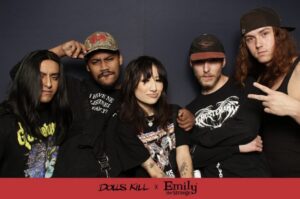
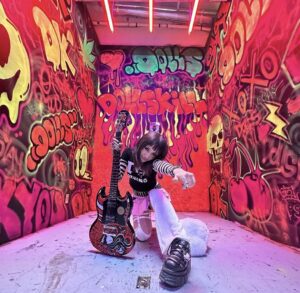

Arana thought that winning the guitar was a sign for her to apply for a job there, so she did.
At the Dolls Kill interview, Arana sat by another interviewee, Nova StClair, who would soon turn into one of her best friends. “Dani came in with a fur black and white checkered jacket and I thought it just looked so cool,” StClair told me. “Once Dani sat down it was just an energy spark between us — it was like ‘you look so hot,’ then Dani responded, ‘no, you look so hot. Let’s be friends.’”
To StClair, Arana has an inviting energy and is a genuine friend: “Dani is lively, open, loving, powerful, nurturing and always just trying to keep it real.” StClair is also a musician, with an animated way of talking, and I could see how the two are a good fit as friends.
“Dani does well at finding a melody and harmony,” StClair said after watching Arana perform at a New York show in January 2023. “Dani does well when annunciating words, when spitting or rapping — we can hear Dani.”
Arana’s interview at Dolls Kill went very well, and a day later, she got the job.
Working at Dolls Kill had its perks for Arana. There was a D.J. set and, being the musician she is, she jumped on the opportunity to practice at the store when she could. With a $3,000 D.J. set in front of her, Arana could not resist. “I figured out what the highs were, the mids, how to mix and how to spin,” she says. She learned how to play it within a month.
“I always wanted to D.J.,” Arana says. “I literally taught myself at work. I’m D.J. Dani Doki.”
***
One afternoon, I find Arana D.J.-ing at the back of the Dolls Kill store during her shift. She has her typical all-black look except for a neon-lettered cropped shirt with the words “F*** Him” on it. Arana shows off her belly button piercing, and I can see some of her 19 tattoos tracing down her arms. She shows me her Nana Osaki tattoo on her right shoulder, smiling.
Arana spins the tracks, effortlessly nodding her head to the sounds of the music booming through the giant white mushroom-looking speakers.
Entering Dolls Kill is like opening a portal to a nightclub, complete with a curtain of red plastic streamers at the door. The clothing is gothic-style, with fur coats going down to the floor and black pieces with pops of neon. Mannequins sport tight, skimpy dresses, but also plaid flowing ones. Some are in cages, and others are in rave lingerie. The booming music makes your body vibrate as you walk around. Arana isn’t walking — she’s rolling on Heelys. Arana lunges her body forward with the single wheel on each foot, taking her around the store at lightning speed.
Arana wheels to the shoe section, asking one of the two ladies trying on eight-inch platform boots if they need any help. One is testing whether she can walk and jump with them. They are getting ready for a rave party. Arana happily supports their decision on the coolness of the shoe and walkability. With the successful try-on, the two are excited and buy them.
Arana tells the two of the 20% sale that will apply to their purchase, rings up the item, and looks at them with a bubbly smile, saying “Thank you so much, have a great day.”
***
It’s Friday night in Sterling, Va., in an abandoned home. Even Arana doesn’t know whose house it is. It’s small with the smell of marijuana and clustered bodies — like a frat party. There’s writing in black marker on the bright orange walls like, “life should be dope so smoke.” It’s dark, with a red club light shining. In the kitchen, people socialize and eat tacos.
Arana is D.J.-ing in a tight black dress covered in white graphics and boots that look like black wigs made of fur going up to the knees. You can see the rest of her tattoos going down her legs. Gajan and the rest of the band mates sit and jam beside her. Arana sips a Guinness.
Before Arana performs, there are a few artists on stage. One of them sings screamo music that starts out slow before turning into heavy metal. Arana sits tapping her foot to the beat while Gajan mouths the words. When the beat drops, Arana comes closer throwing on her sporty glasses and bobbing her head back and forth. The crowd is swaying at times, jumping at others, and even pushing each other in a mosh. Everyone is into it. Even the guys on the side are adamantly recording on their phones.
“I used to be so nervous,” Arana says. But now, she is confident with her sound, and most of the time she doesn’t need a sound check. “Now, I typically just wing it.”
Arana takes off her glasses and runs to the stage. “Came all the way from New York,” she says. Scotty throws his sporty glasses on, and long-haired Patch swings his hair forward. She jumps and screams into the mic with the audience jumping and bobbing their heads to Fatal Attraction. Arana likes to play with the vibe in the room, starting slow, swaying her body while singing, “standing in the kitchen, hand on a cig in a house that keeps getting smaller,” then screaming “1, 2, 3!” when the beat drops. “It’s a fatal attraction / my heart is relapsing,” she sings, jumping with the crowd. “It’s so easy to fall back into what was finally past / starting days with backed up noses and sifting through prepared poses.”
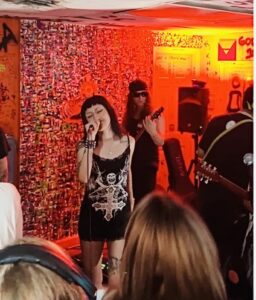
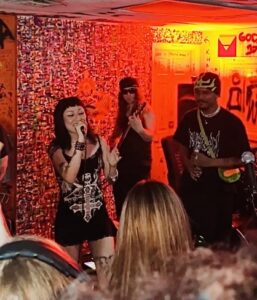

“The song has to do with my old cocaine addiction,” Arana explains the next day. “That I had overcome it.”
From ages 17 to 19, Arana had struggled with cocaine use, and the song was written by her sister, Andrea Arana, watching her at home. “It’s funny, because now I hate it,” Arana says. “Since I was 20-years–old, I stopped doing it.”
At the end of Arana’s performance, Gajan and Arana share a tight hug.
In the recording studio, the two share the same passion, which excites Arana most. “I love it when I am making a song, then I hear it for the first time, and Dev and I are just nodding at each other the whole time from excitement,” Arana said. “We start jumping around and give each other high-fives, like we are kids all over again. I feel so happy, I don’t even realize how the time is passing.”
Arana’s inspiration comes from rock music she listened to as a kid. “My favorite bands were Pierce The Veil, Linkin Park, Sleeping With Sirens, Deftones and Bring Me The Horizon,” Arana says.
Some of her influence could have arguably come from her mother, Claudia Tellez. “I love the punk rock genre. I’ve always loved it — she’s been influenced by it because I used to play it a lot when they were little. Not only punk rock but also Latin American punk rock bands like La Ley,” Tellez tells me.
Arana’s parents are not musicians, just music lovers. They support Arana in her dreams of becoming an artist. “I love that the band is very diverse, it’s super cool. They’re very serious about their work,” Tellez says. “I’m proud of the work and the songs, and although there are some things that she sings that I don’t like, I still have an appreciation for it. I love when she sings her punk rock.”
They enjoy listening to her music, sometimes playing it at random moments, which embarrasses Arana — but she is glad they are on the same page. Arana’s mother is from Cochabamba, Bolivia, and her father is from San Marcos, Guatemala. Her mother is the director of a medical society in Virginia and her father works for a mortgage company.
“When I see her perform, she has that presence,” Tellez says. “She’s always been very intrepid. Nothing conventional applies to her.”
Growing up, her mom watched Arana’s admiration for anime. “I totally see her going to Japan. She developed a lot of that very early on too,” Tellez says. “She’s a Japanophile. That’s what I call her. She really has an affinity with that culture.”
Arana has plans to make it big in the music industry. “Hopefully one day I’ll have a big crowd,” Arana says. “I’d like to be at the level where my presence is known enough that I could just post something on Instagram and just have a ton of people show up.”
She says that the hardest part of being an artist is being an individual. “I think it’s hard these days, because the whole culture is submerged with so much auto-tune that the lyrics are meaningless,” Arana says.
Arana says that her raw sound is what makes her different from the mainstream. “I sing from the heart and want to be heard instead of just trying to massively produce,” Arana says. “When you hear my voice, I want you to have goosebumps.”
She already got a taste of what that success could look like. “In my first show in New York, I saw people singing along to my music for the first time. I was like — holy s***.”


